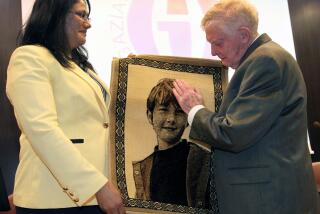Living Heart Donor Feels Lucky; Recipient Grateful
- Share via
BALTIMORE — The first living American heart donor sat next to the man he gave his heart to and said Friday that he was fortunate that he “didn’t have to die to donate.”
Clinton House, a 28-year-old cystic fibrosis patient who received both lungs and the heart of a traffic accident victim 11 days ago, said he had no hesitation when his doctor asked him to make his healthy heart available to someone else.
“Not with what I was getting,” said House, of Baltimore.
John Couch, 38, of Yardley, Pa., had his diseased heart replaced by House’s heart in the “domino-donor” transplant operation, the first of its kind in the United States. Two such procedures have recently been performed in England.
“You don’t usually get a chance to thank your donor,” said Couch, a former financial analyst.
‘He’s the Star’
“Fortunately, in my case I didn’t have to die to donate,” House said. “That was great. Unfortunately, my donor had to. He’s the star in this. I don’t know who he is. My condolences go out to his family.”
House and Couch met for the first time Thursday at the Johns Hopkins Hospital and spoke to two reporters Friday. The two walked into a small patients’ lounge on the eighth floor of the hospital. After the reporters and photographers donned surgical masks, House and Couch removed theirs.
Couch said that, because he and House just met, “There’s not really that much of a relationship between us on a personal standpoint.” But they agreed to keep in touch for the rest of their lives.
House, whose diseased lungs forced him to wear an oxygen mask for three years, said he felt great with his new lungs and heart.
“It’s just a total relief to be able to walk around and not get out of breath,” he said. “I can’t wait to get back to work, mainly.” He said he works in the refrigeration business.
Higher Success Rate
Johns Hopkins doctors said they did not want to transplant only lungs into House because the success rate is much better when a heart-lung combination is used.
Couch, who suffered a major heart attack two years ago, said he too feels “much, much better.”
Hospital officials said both patients remained in satisfactory condition. Both are eating solid food and have periodic workouts on exercise bicycles.
Couch said he hoped that the meeting with reporters would help to spread the word about the nation’s critical need for organ donors.
He said it was unfortunate that “some people die while they’re on a waiting list.”
More to Read
Sign up for Essential California
The most important California stories and recommendations in your inbox every morning.
You may occasionally receive promotional content from the Los Angeles Times.










